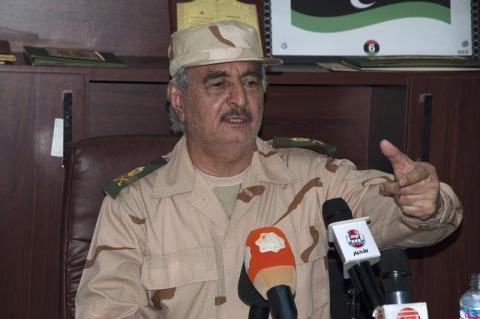Advertisement
Libya's parliament allies with renegade general, struggling to assert authority
BENGHAZI Libya (Reuters) - Libya's beleaguered elected parliament has declared a formal alliance with a renegade former general, as it struggles to assert some authority in a country many fear is sliding into outright civil war.
Three years after the overthrow of Muammar Gaddafi, the oil-producing desert state is in chaos, with Islamists and other militias fighting for territory and influence and the regular armed forces reduced to near-impotence.
One faction has seized Tripoli, setting up its own assembly and administration in the capital and forcing the internationally-recognised government to take refuge in the east of the country.
Khalifa Haftar, a former general under Gaddafi, is one of dozens of commanders of irregular forces calling the shots in the country. Last week, his forces launched a new offensive against Islamist militias in the eastern city of Benghazi.
The House of Representatives, Libya's elected parliament which has relocated to Tobruk in the far east, has endorsed Haftar's Operation Dignity against Islamists, giving him an official role, parliament spokesman Farraj Hashem said.
"Operation Dignity is leading officers and soldiers of the Libyan army ... Operation Dignity is an operation of the Libyan army," he said late on Sunday.
The move appears in contradiction to past calls from the House of Representatives for all militias to be disarmed to help restore order and rebuild the state.
The decision to endorse Haftar might also worsen a conflict between the House of Representatives, allied to the internationally-recognised government of Prime Minister Abdullah al-Thinni, and the new rulers of Tripoli.
Both recognized bodies have been based in eastern Libya since an armed group from the western city of Misrata seized Tripoli in August and set up its own assembly and government there.
The Misrata faction has denounced Haftar as a Gaddafi loyalist who is trying to stage a counterrevolution with other officials of the former regime. Haftar helped Gaddafi seize power in 1969 but fell out with the former strongman in the 1980s.
TIME RUNNING OUT
Western powers and Libya's Arab neighbors fear conflict is dragging the North African country towards full-blown civil war.
The United Nations has started negotiations to bring an end to the fighting among factions, but an alliance of Islamist militia groups has refused to take part in the talks.
"We have the possibility of a major threat in Libya in a few months' time unless we are able to stabilize the country," Bernadino Leon, the U.N. special envoy to Libya, told reporters after briefing EU foreign ministers meeting in Luxembourg.
"The situation is so unstable, there is so much chaos," he said. "We need to act immediately."
In a statement, the ministers called for action and condemned the violence but offered no new measures or funds.
Leon said there would be dialogue only with those who recognized the House of Representatives in Tobruk.
"The House of Representatives is the only legitimate body in the country and this parliament could appoint a national unity government," he said.
U.N.-brokered talks began on Sept. 29 in Ghadames, a southern town near the Algerian border, to seek a framework for a ceasefire, ensure humanitarian aid for victims of the violence and reopen airports closed by fighting.
Leon said groups such as Islamic State, which has seized large areas of Syria and Iraq, could move into Libya and destabilize the whole region.
(Additional reporting by Robin Emmott in Luxembourg; writing by Ulf Laessing; editing by Andrew Roche)



















Add new comment